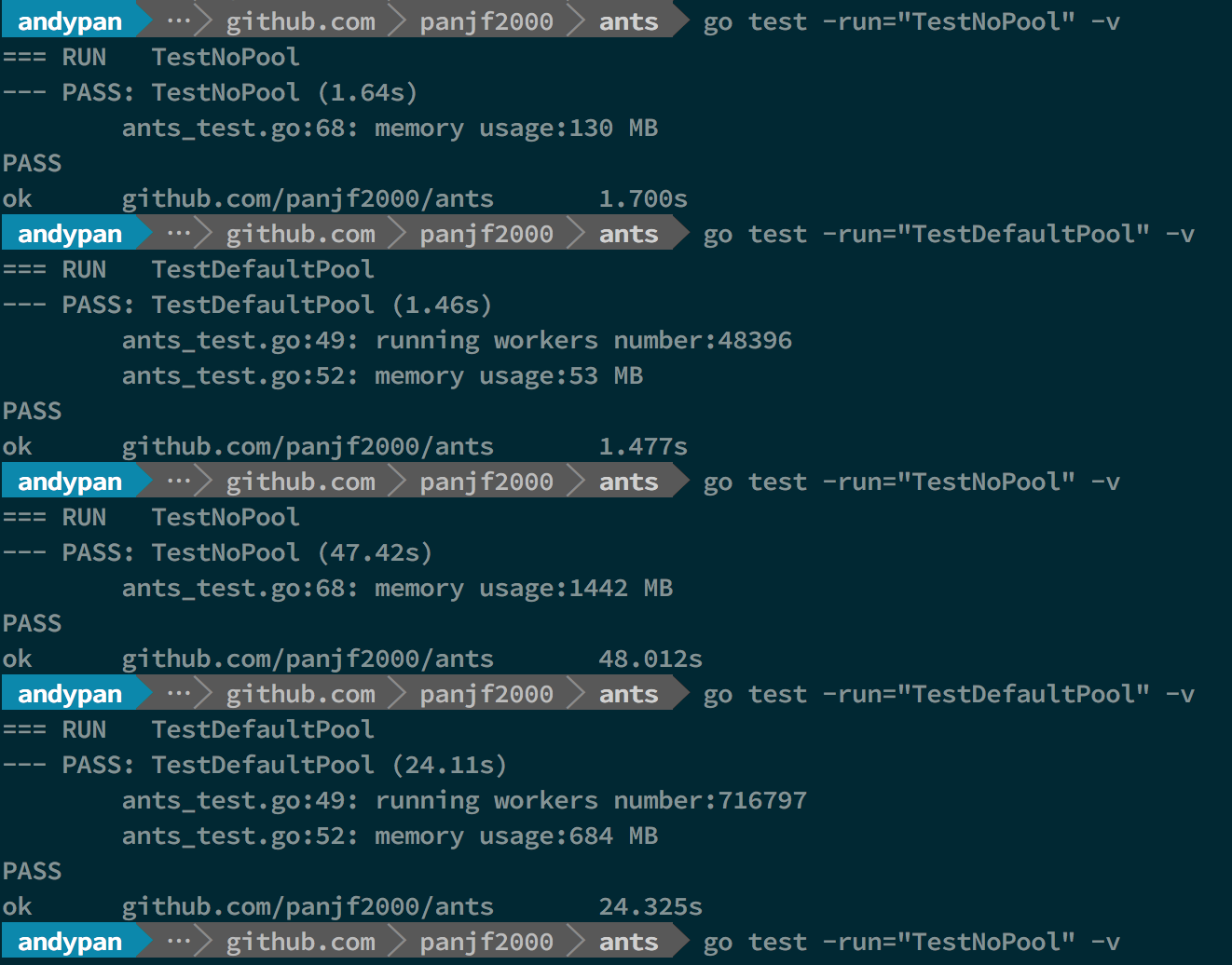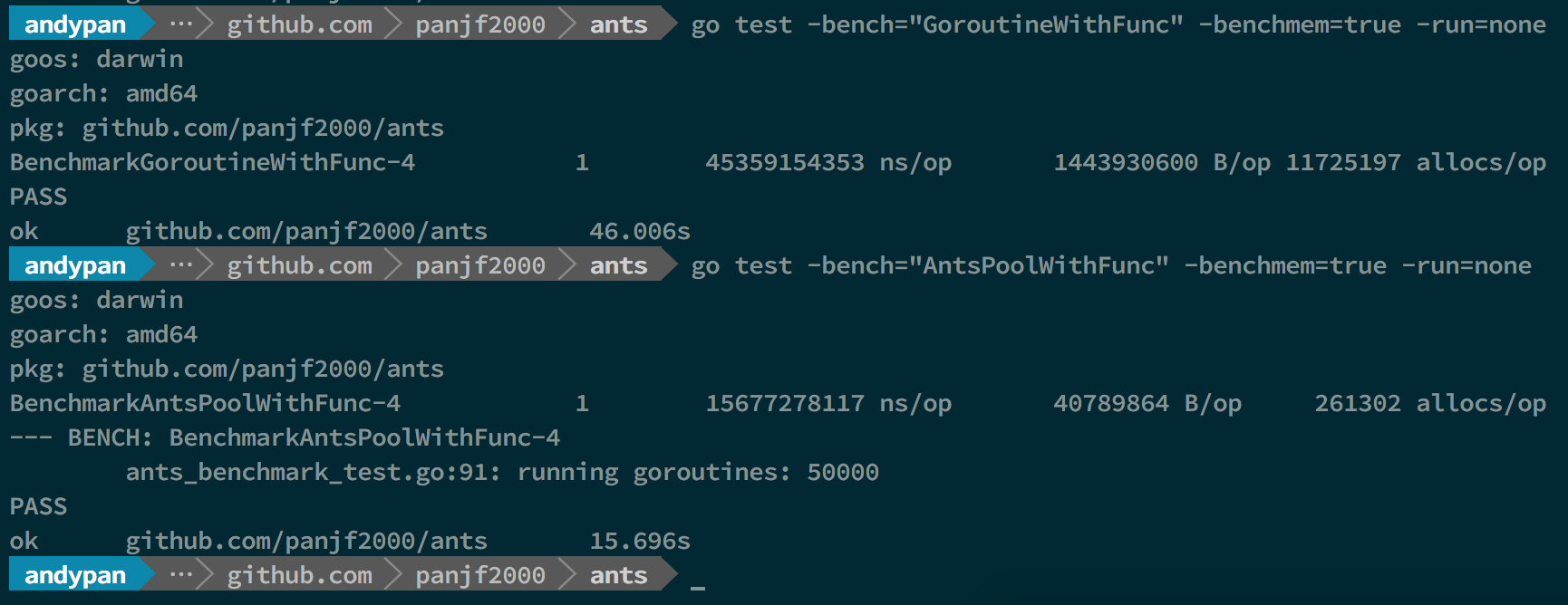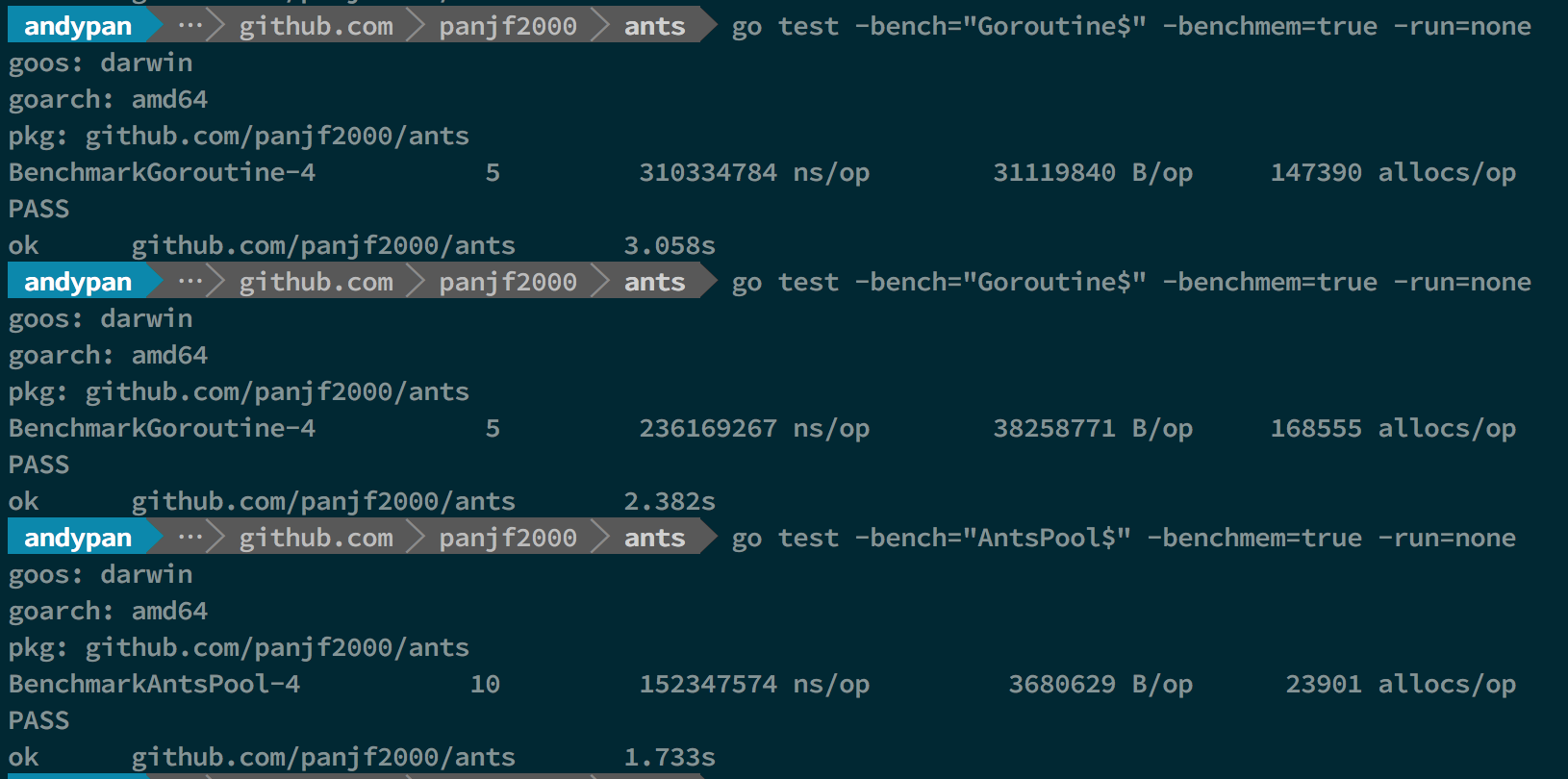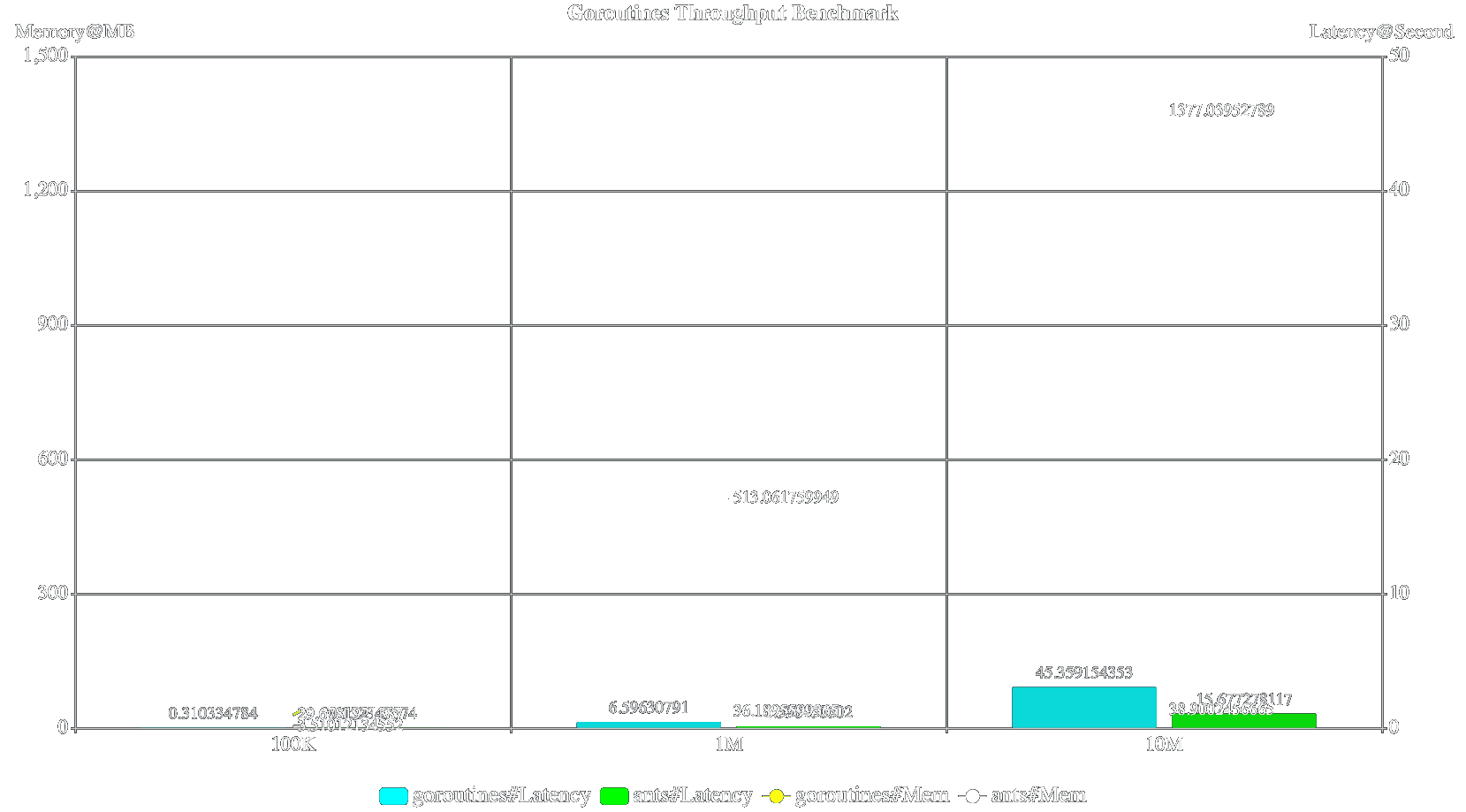* add loop queue
* add loop queue
* fix the bugs
add loop queue
move the worker queue to directory
按照新的接口实现 lifo 队列
添加新接口的环形队列实现
rename the slice queue
修复了 unlock
使用 queue 管理 goWorkerWithFunc
使用 dequeue 判断队列
add remainder
增加测试文件
循环队列需要一个空闲位
* remove interface{}
* Refine the logic of sync.Pool
* Add flowcharts of ants into READMEs
* Add the installation about ants v2
* Renew the functional options in READMEs
* Renew English and Chinese flowcharts
* rename package name
移动 worker queue 位置
worker queue 都修改为私有接口
考虑到性能问题,把 interface{} 改回到 *goworker
* 修改 releaseExpiry 和 releaseAll
* remove files
* fix some bug
|
||
|---|---|---|
| .github | ||
| examples | ||
| internal | ||
| .gitignore | ||
| .travis.yml | ||
| CODE_OF_CONDUCT.md | ||
| CONTRIBUTING.md | ||
| LICENSE | ||
| README.md | ||
| README_ZH.md | ||
| ants.go | ||
| ants_benchmark_test.go | ||
| ants_test.go | ||
| go.mod | ||
| pool.go | ||
| pool_func.go | ||
| worker.go | ||
| worker_func.go | ||
| worker_loop_queue.go | ||
| worker_loop_queue_test.go | ||
| worker_queue.go | ||
| worker_stack.go | ||
| worker_stack_test.go | ||
README.md
ants
[中文]
Library ants implements a goroutine pool with fixed capacity, managing and recycling a massive number of goroutines, allowing developers to limit the number of goroutines in your concurrent programs.
Features:
- Managing and recycling a massive number of goroutines automatically
- Purging overdue goroutines periodically
- Friendly interfaces: submitting tasks, getting the number of running goroutines, tuning capacity of pool dynamically, closing pool
- Handle panic gracefully to prevent programs from crash
- Efficient in memory usage and it even achieves higher performance than unlimited goroutines in Golang
- Nonblocking mechanism
Tested in the following Golang versions:
- 1.8.x
- 1.9.x
- 1.10.x
- 1.11.x
- 1.12.x
- 1.13.x
ants works as the flowing flowchart

How to install
For ants v1
go get -u github.com/panjf2000/ants
For ants v2
go get -u github.com/panjf2000/ants/v2
How to use
Just take a imagination that your program starts a massive number of goroutines, resulting in a huge consumption of memory. To mitigate that kind of situation, all you need to do is to import ants package and submit all your tasks to a default pool with fixed capacity, activated when package ants is imported:
package main
import (
"fmt"
"sync"
"sync/atomic"
"time"
"github.com/panjf2000/ants/v2"
)
var sum int32
func myFunc(i interface{}) {
n := i.(int32)
atomic.AddInt32(&sum, n)
fmt.Printf("run with %d\n", n)
}
func demoFunc() {
time.Sleep(10 * time.Millisecond)
fmt.Println("Hello World!")
}
func main() {
defer ants.Release()
runTimes := 1000
// Use the common pool.
var wg sync.WaitGroup
syncCalculateSum := func() {
demoFunc()
wg.Done()
}
for i := 0; i < runTimes; i++ {
wg.Add(1)
_ = ants.Submit(syncCalculateSum)
}
wg.Wait()
fmt.Printf("running goroutines: %d\n", ants.Running())
fmt.Printf("finish all tasks.\n")
// Use the pool with a function,
// set 10 to the capacity of goroutine pool and 1 second for expired duration.
p, _ := ants.NewPoolWithFunc(10, func(i interface{}) {
myFunc(i)
wg.Done()
})
defer p.Release()
// Submit tasks one by one.
for i := 0; i < runTimes; i++ {
wg.Add(1)
_ = p.Invoke(int32(i))
}
wg.Wait()
fmt.Printf("running goroutines: %d\n", p.Running())
fmt.Printf("finish all tasks, result is %d\n", sum)
}
Integrate with http server
package main
import (
"io/ioutil"
"net/http"
"github.com/panjf2000/ants/v2"
)
type Request struct {
Param []byte
Result chan []byte
}
func main() {
pool, _ := ants.NewPoolWithFunc(100000, func(payload interface{}) {
request, ok := payload.(*Request)
if !ok {
return
}
reverseParam := func(s []byte) []byte {
for i, j := 0, len(s)-1; i < j; i, j = i+1, j-1 {
s[i], s[j] = s[j], s[i]
}
return s
}(request.Param)
request.Result <- reverseParam
})
defer pool.Release()
http.HandleFunc("/reverse", func(w http.ResponseWriter, r *http.Request) {
param, err := ioutil.ReadAll(r.Body)
if err != nil {
http.Error(w, "request error", http.StatusInternalServerError)
}
defer r.Body.Close()
request := &Request{Param: param, Result: make(chan []byte)}
// Throttle the requests traffic with ants pool. This process is asynchronous and
// you can receive a result from the channel defined outside.
if err := pool.Invoke(request); err != nil {
http.Error(w, "throttle limit error", http.StatusInternalServerError)
}
w.Write(<-request.Result)
})
http.ListenAndServe(":8080", nil)
}
Functional options for ants pool
// Option represents the optional function.
type Option func(opts *Options)
// Options contains all options which will be applied when instantiating a ants pool.
type Options struct {
// ExpiryDuration set the expired time (second) of every worker.
ExpiryDuration time.Duration
// PreAlloc indicate whether to make memory pre-allocation when initializing Pool.
PreAlloc bool
// Max number of goroutine blocking on pool.Submit.
// 0 (default value) means no such limit.
MaxBlockingTasks int
// When Nonblocking is true, Pool.Submit will never be blocked.
// ErrPoolOverload will be returned when Pool.Submit cannot be done at once.
// When Nonblocking is true, MaxBlockingTasks is inoperative.
Nonblocking bool
// PanicHandler is used to handle panics from each worker goroutine.
// if nil, panics will be thrown out again from worker goroutines.
PanicHandler func(interface{})
}
// WithOptions accepts the whole options config.
func WithOptions(options Options) Option {
return func(opts *Options) {
*opts = options
}
}
// WithExpiryDuration sets up the interval time of cleaning up goroutines.
func WithExpiryDuration(expiryDuration time.Duration) Option {
return func(opts *Options) {
opts.ExpiryDuration = expiryDuration
}
}
// WithPreAlloc indicates whether it should malloc for workers.
func WithPreAlloc(preAlloc bool) Option {
return func(opts *Options) {
opts.PreAlloc = preAlloc
}
}
// WithMaxBlockingTasks sets up the maximum number of goroutines that are blocked when it reaches the capacity of pool.
func WithMaxBlockingTasks(maxBlockingTasks int) Option {
return func(opts *Options) {
opts.MaxBlockingTasks = maxBlockingTasks
}
}
// WithNonblocking indicates that pool will return nil when there is no available workers.
func WithNonblocking(nonblocking bool) Option {
return func(opts *Options) {
opts.Nonblocking = nonblocking
}
}
// WithPanicHandler sets up panic handler.
func WithPanicHandler(panicHandler func(interface{})) Option {
return func(opts *Options) {
opts.PanicHandler = panicHandler
}
}
ants.Optionscontains all optional configurations of ants pool, which allows you to customize the goroutine pool by invoking option functions to set up each configuration in NewPool/NewPoolWithFuncmethod.
Customize limited pool
ants also supports customizing the capacity of pool. You can invoke the NewPool method to instantiate a pool with a given capacity, as following:
// Set 10000 the size of goroutine pool
p, _ := ants.NewPool(10000)
Submit tasks
Tasks can be submitted by calling ants.Submit(func())
ants.Submit(func(){})
Tune pool capacity in runtime
You can tune the capacity of ants pool in runtime with Tune(int):
pool.Tune(1000) // Tune its capacity to 1000
pool.Tune(100000) // Tune its capacity to 100000
Don't worry about the synchronous problems in this case, the method here is thread-safe (or should be called goroutine-safe).
Pre-malloc goroutine queue in pool
ants allows you to pre-allocate memory of goroutine queue in pool, which may get a performance enhancement under some special certain circumstances such as the scenario that requires a pool with ultra-large capacity, meanwhile each task in goroutine lasts for a long time, in this case, pre-mallocing will reduce a lot of costs when re-slicing goroutine queue.
// ants will pre-malloc the whole capacity of pool when you invoke this method
p, _ := ants.NewPool(100000, ants.WithPreAlloc(true))
Release Pool
pool.Release()
About sequence
All tasks submitted to ants pool will not be guaranteed to be addressed in order, because those tasks scatter among a series of concurrent workers, thus those tasks would be executed concurrently.
Benchmarks

-
BenchmarkGoroutine-4 represents the benchmarks with unlimited goroutines in golang.
-
BenchmarkPoolGroutine-4 represents the benchmarks with a
antspool.
Benchmarks with Pool
In above benchmark result, the first and second benchmarks performed test cases with 1M tasks and the rest of benchmarks performed test cases with 10M tasks, both in unlimited goroutines and ants pool, and the capacity of this ants goroutine-pool was limited to 50K.
As you can see, ants performs 2 times faster than goroutines without pool (10M tasks) and it only consumes half the memory comparing with goroutines without pool. (both in 1M and 10M tasks)
Benchmarks with PoolWithFunc
Throughput (it is suitable for scenarios where tasks are submitted asynchronously without waiting for the final results)
100K tasks
1M tasks
10M tasks
Performance Summary
In conclusion, ants performs 2~6 times faster than goroutines without a pool and the memory consumption is reduced by 10 to 20 times.
License
Source code in gnet is available under the MIT License.
 A goroutine pool for Go
A goroutine pool for Go










